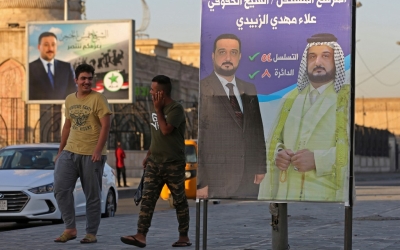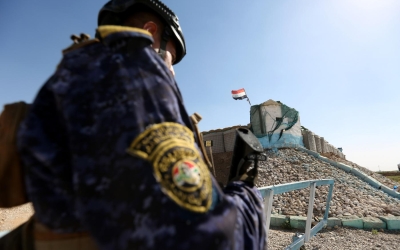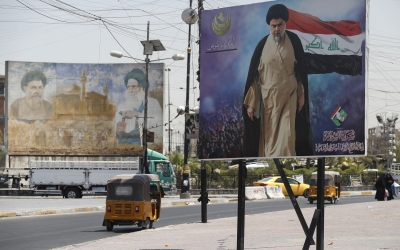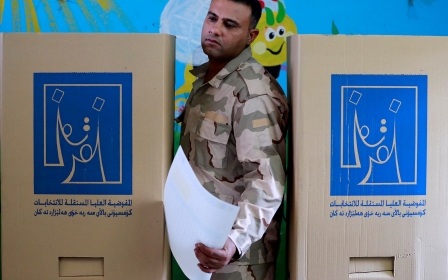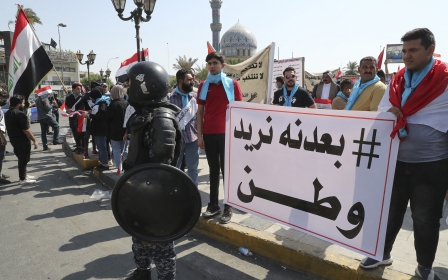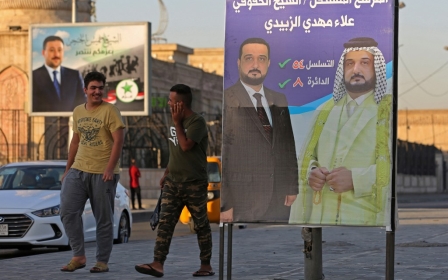Iraq elections 2021: Iran ally Fatah dealt triple blow in pursuit of power
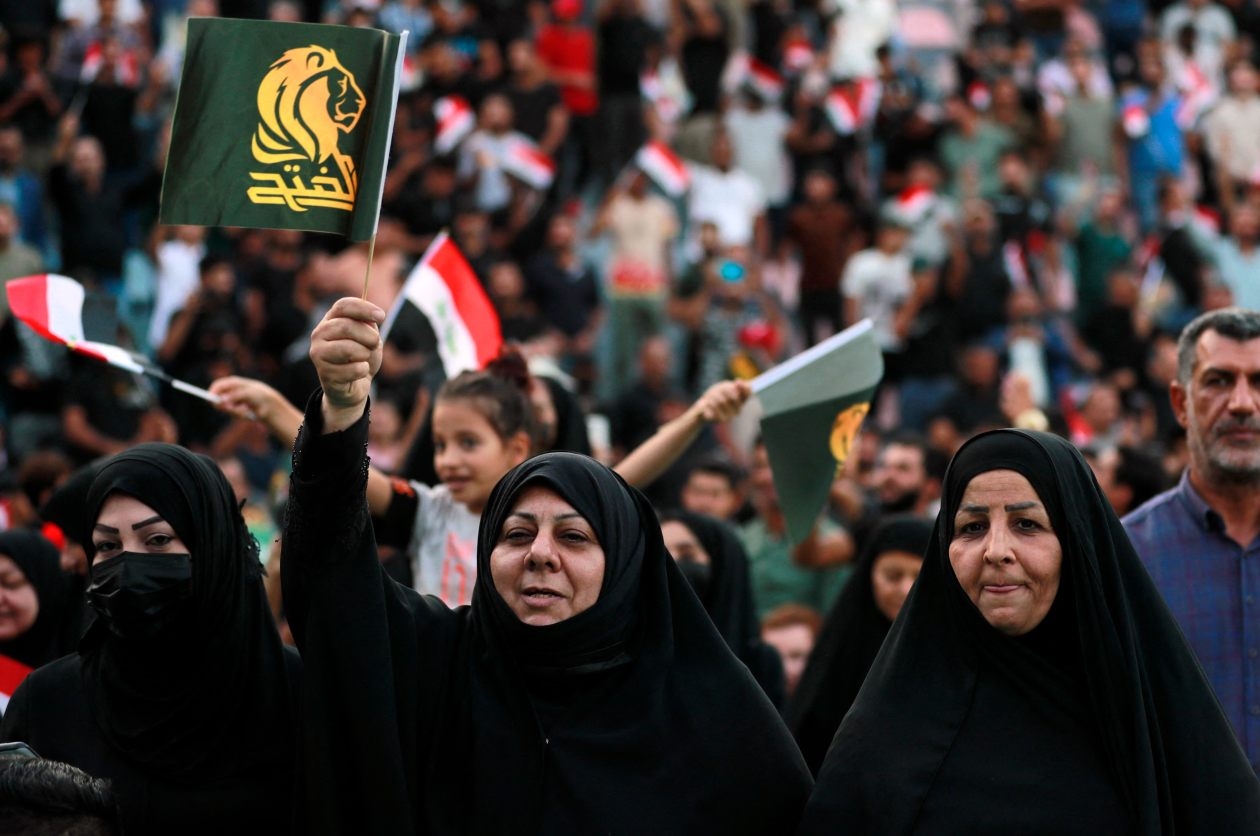
Boasting the diehard support of many Iraqis and the might of Iran at its side, the Fatah bloc had hoped Sunday’s elections would see it make significant gains in Iraq’s parliament and form the next government. Instead, Iraqi observers and officials told Middle East Eye, the bloc has lost tens of thousands of guaranteed votes in Baghdad and the southern provinces after taking several blows.
Chief among these setbacks is the decision to deprive fighters in the Hashd al-Shaabi paramilitary umbrella group, which is controlled almost entirely by Fatah leaders, from participating in preliminary voting on Friday - in the Iraqi capital, voting among the forces has been restricted to security forces.
New MEE newsletter: Jerusalem Dispatch
Sign up to get the latest insights and analysis on Israel-Palestine, alongside Turkey Unpacked and other MEE newsletters
This means Hashd fighters will have to travel to their home towns to vote – even though thousands are deployed across various parts of Iraq, and making their way back for polling day may be next to impossible for many.
The Iranian-backed Fatah Alliance - which consists of the political wings of several prominent Shia Muslim armed factions, including the Badr Organization and Asaib Ahl al-Haq - has been relying heavily on winning the votes of two-thirds of the Hashd’s forces, whose total number, according to the salary lists, exceeds 130,000 fighters.
“The Fatah leaders and their candidates have not achieved anything in recent years, so they are completely dependent on the achievements of the Hashd al-Shaabi and the votes of its fighters and their families,” a senior Hashd commander told MEE. “What seats Fatah gets will be thanks to the Hashd fighters.”
The decision of the Independent High Electoral Commission (IHEC) to prevent Hashd voters from the preliminary vote for “technical reasons” was an “unexpected surprise at a very critical time”, sources told MEE.
"The votes of their Hashd fighters are 100 percent guaranteed votes from the point of view of the Fatah leaders. Now they have lost these votes," Professor Qusai Mahbuba, a strategic leadership expert, told MEE.
"Preventing the Hashd fighters from participating in the special vote was a great surprise that confused the Fatah leadership very much."
On Saturday, the IHEC said its decision was caused by the Hashd al-Shaabi’s refusal to provide it with the names of its fighters in a timely manner. But a number of Fatah leaders consider the decision a “conspiracy” to prevent the alliance from winning the largest number of seats.
Ahmed al-Asadi, one of the most prominent Fatah leaders, addressed his bloc’s supporters on Sunday, saying: “Your brothers in the Hashd al-Shaabi have been deprived of special voting, and therefore they cannot vote unless they leave the battlefronts and return to their homes.
"I invite you to go to vote intensively to make up for the votes of our heroes who will be our defenders in the battlefronts, so that we achieve our victory," he added.
Although the Hashd leadership knew all too well that Fatah’s political dominance relies on its fighters, it insisted on withholding the information of its troops for security reasons.
"We asked them [IHEC] to approve the previous lists that were sent to IHEC during the 2018 elections, but they refused,” a senior Hashd official told MEE. "We had long discussions with the IHEC. They were trying to prove to us that all the servers they use are fully secured, and that there is no risk to any information we provide them with,” he added.
"We know that the company hosting the servers is Emirati, and this means our database, the names of our commanders, the areas where our forces are deployed, and their addresses will be vulnerable to leakage."
Kadhimi strikes the second blow
Disruption to the Hashd’s voting is far from the only hammer blow Fatah has received.
For weeks, its leaders have loudly trumpeted the promise that Fatah would ensure the rehiring of 30,000 fighters removed from the Hashd for various reasons since 2017.
Yet funding for this has always loomed large over the pledge.
A workaround was found: state funds allocated for buying fuel were rerouted to pay these 30,000 salaries. But the prime minister and finance minister were both required to sign off on the plan.
Prime Minister Mustafa al-Kadhimi put his pen to the scheme, a prominent Hashd commander told MEE. Yet Finance Minister Ali Abdul-Amir Allawi reportedly "refused" to ratify the decision, arguing there was no material need to swell the Hashd’s ranks, sources said.
The minister also pointed out, sources said, that the funds diverted from fuel would only cover the salaries for two months.
"Allawi threatened to resign if Kadhimi insisted on passing the resolution,” a prominent Hashd commander said, adding that influential Shia cleric Muqtada al-Sadr then stepped in.
“Sadr supported Allawi in his position and pressured Kadhimi into regretting his decision, so it was cancelled."
Najaf lands the third blow
Fatah, riding on a wave of success following the Hashd’s key role in defeating the Islamic State group, enjoyed huge support before October 2019. Then vast anti-government demonstrations broke out, and Fatah’s support for Adel Abdul Mahdi’s government and the violent and deadly reaction of some Shia factions, severely undermined the bloc in its heartlands of Baghdad and the south.
Voters weren’t disillusioned with Fatah alone, however: a low turnout is expected among voters for all parties in Sunday’s elections.
Fatah hoped to use this to its advantage – as the traditional parties still enjoyed much loyal support. Then came a call from Grand Ayatollah Ali al-Sistani, the supreme leader of the Shia community in Iraq, asking all his followers to participate widely in the elections.
The Najaf-based cleric told Iraqis to avoid voting for corrupt candidates and those who failed to provide something for their voters over the past few years, shortcomings of which Fatah leaders have regularly been accused.
"The monitoring teams working with us recorded a significant increase in the number of people who decided to participate in the elections in response to the call of Mr Sistani - in all provinces," Ali Taher al-Hammoud, head of the Al-Bayan Centre for Studies and Planning, told MEE.
The greater the turnout, the more small lists and independent candidates will succeed, Hammoud predicted.
"Sixty percent of the public, especially in the central and southern governorates, declared they would refuse to vote for the existing traditional forces, especially Fatah and [Sadr’s] Sairoon,” he said. “However, Fatah and its allies will be affected to a greater extent, due to the gap created between them and their masses in the centre and the south by the October [2019] demonstrations.”
With the headwinds blowing strongly against them, Fatah leaders, led by Hadi al-Amiri, and Asaib Ahl al-Haq’s Qais al-Khazali have intensified their campaigning in recent days, with two key messages being hammered home. The first is that Shia-dominated Fatah has been targeted domestically and internationally for sectarian reasons. The second is that they are the protectors of the Hashd al-Shaabi and its forefathers.
Fatah, meanwhile, insists everything is on track and that its electoral chances are as strong as ever.
“The Fatah Alliance enjoys the confidence and support of the Iraqi people, especially in the central and southern governorates, because it is the strongest alliance that made sacrifices and stood in the face of American and Zionist projects,” Saad al-Saidi, a member of Asaib Ahl al-Haq’s political bureau, told MEE.
"Also, we are the coalition that supported the Hashd al-Shaabi against the conspiracies that target it... Therefore I think that the Fatah coalition is the most likely to obtain a parliamentary majority and will form the next government in cooperation with the blocs that share with us the national concern."
Middle East Eye delivers independent and unrivalled coverage and analysis of the Middle East, North Africa and beyond. To learn more about republishing this content and the associated fees, please fill out this form. More about MEE can be found here.


